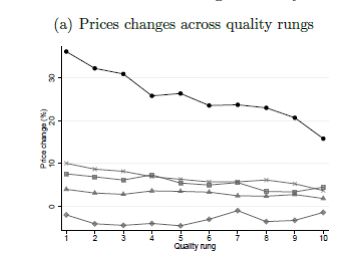Peter Levell
@peterlevell.bsky.social
Economist. Deputy Research Director at the Institute for Fiscal Studies @theifs.bsky.social.
https://sites.google.com/view/peter-levell/home
https://sites.google.com/view/peter-levell/home
9/ To see if cost shocks pass through to cheaper items more generally, we also looked at a cleaner cost shock from the recent past. Around the Brexit referendum, the pound fell sharply against the Euro. We’d expect this to affect the costs of cheap and expensive EU imports equally.

August 14, 2024 at 6:37 AM
9/ To see if cost shocks pass through to cheaper items more generally, we also looked at a cleaner cost shock from the recent past. Around the Brexit referendum, the pound fell sharply against the Euro. We’d expect this to affect the costs of cheap and expensive EU imports equally.
7/ If we split products into different 10 levels of “quality” (assuming cheaper products are not as nice as more expensive ones), we see that products in the bottom quality rung saw price increase of 36% compared to 16% for the top quality rung.

August 14, 2024 at 6:36 AM
7/ If we split products into different 10 levels of “quality” (assuming cheaper products are not as nice as more expensive ones), we see that products in the bottom quality rung saw price increase of 36% compared to 16% for the top quality rung.
5/ It turns out that most of the differences in inflation rates across households is not because of differences across categories or types, rather it is because of differences in what exact products they buy *within* categories.

August 14, 2024 at 6:35 AM
5/ It turns out that most of the differences in inflation rates across households is not because of differences across categories or types, rather it is because of differences in what exact products they buy *within* categories.
3/ In a break with recent history, the cost of buying the typical grocery baskets of poorer (lower spending) households also rose by more than richer households. Households in the bottom quarter of spending saw inflation rates 5.6ppt higher than those in top quarter.

August 14, 2024 at 6:34 AM
3/ In a break with recent history, the cost of buying the typical grocery baskets of poorer (lower spending) households also rose by more than richer households. Households in the bottom quarter of spending saw inflation rates 5.6ppt higher than those in top quarter.
2/ We look at the period September 21 to September 23 using detailed data on grocery purchases. Relative to the past grocery price inflation was very high. There were also large differences in the inflation different households experienced according to what they bought.

August 14, 2024 at 6:15 AM
2/ We look at the period September 21 to September 23 using detailed data on grocery purchases. Relative to the past grocery price inflation was very high. There were also large differences in the inflation different households experienced according to what they bought.
Great to see the work I did with Elaine Drayton and David Sturrock featured in the Economist.
Housing supply elasticities in England are low, especially in London and the South East, as we document here tinyurl.com/4hpxn3rw
Housing supply elasticities in England are low, especially in London and the South East, as we document here tinyurl.com/4hpxn3rw

August 9, 2024 at 12:17 PM
Great to see the work I did with Elaine Drayton and David Sturrock featured in the Economist.
Housing supply elasticities in England are low, especially in London and the South East, as we document here tinyurl.com/4hpxn3rw
Housing supply elasticities in England are low, especially in London and the South East, as we document here tinyurl.com/4hpxn3rw

